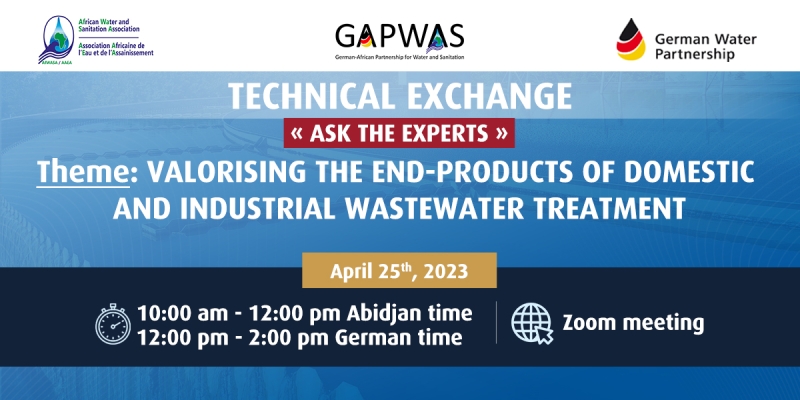The German African Partnership for Water and Sanitation (GAPWAS) is the cooperation project between the African Water and Sanitation Association (AfWASA) and the German Water Partnership (GWP), financed by the German Federal Ministry for Economic Cooperation and Development (BMZ) via the sequa gGmbH. One of the goals of GAPWAS is to facilitate joint workshops as well as technical and peer to peer exchange and to foster contacts between members of GWP and AfWASA.
The present concept contributes to these goals by combining the expertise of German and African experts in the field of water and sanitation in the form of a jointly given interactive workshop for the members of both associations. The joint identification of workshop topics and the opportunity to ask questions underscores the mutual intention to address and share knowledge on real challenges and needs of AfWASA members and thus contribute to improving drinking water supply and sanitation including reuse in the region.
The workshop is conducted online for 2 hours and takes place every two to three months. Each workshop is conducted under a specific technical topic with two experts being members of GWP and two experts from the membership or network of AfWASA.
Ask the experts – 6th edition
The 6th edition of the “Ask the experts” series will be organized on 25th April 2023 at 10h00 UTC (Abidjan time) and the topic to be treated will be:
“Valorising the end-products of domestic and industrial wastewater treatment”.
Wastewater contains essential resources, whose value is increasingly getting appreciated. Along with the global acceptance and support for adopting the paradigm of circular economy, the term ‘waste’water often is replaced by ‘used’water. The formerly ‘wasted’ resources of water, energy and nutrients are getting increasingly expensive and/ or scarce.
Therefore, today’s wastewater treatment systems should be planned from the end: who needs and commits to reuse the treated water, energy and nutrients? What qualities and quantities are needed? This information will guide the design process, i.e. where and how wastewater is collected and treated and corresponding technologies.
The invited Experts will present and discuss two cases:
-
Reuse of excess sludge from industrial wastewater treatment in Ethiopia
The Capital of Addis Ababa has established new industrial clusters. The wastewater of the textile cluster is treated in the industrial park's treatment plant. The produced excess sludge still contains industrial contaminants and therefore is not suitable for agricultural re-use. However, a nearby cement factory is constantly in need of fuel. The experts will describe and explain, how a solar drying process is successfully applied to produce a sludge with 90% dry matter ready to be co- incinerated in the cement factory as renewable energy fuel. The project is enabled and financed by the GIZ facility DeveloPPP.de.
-
Reuse of energy and water from domestic wastewater treatment in the Germany & Namibia
The Free Hanseatic City of Bremen’s wastewater treatment plant has adopted anaerobic digestion of its excess sludge and producing electricity from the captured biogas to power it’s blower units for the activated sludge process as early as 1966. Since 2014, the utility including the wastewater treatment works – one of the highest energy consumers in many cities around the globe –are fully energy neutral, thanks to a number of additional measures taken over the years.
The City of Windhoek is situated in a desert-like climate with an average annual rainfall around 360 mm and an annual evaporation of 3,400 mm. It is known for having started reusing parts of its treated domestic wastewater for drinking water production as early as 1969. Over the years, it’s facilities for treating and reclaiming wastewater for potable use have been updated in an effort to cope with a population having grown from less than 100,000 inhabitants in 1980 to more than 430,000 in 2020.
Besides sharing impressive facts and figures around the reuse of water, energy and nutrients in Bremen and Windhoek, the experts will share important elements of their learning journey from day-to-day operation of treatment plants, e.g., understanding the performance of the plant at different steps of the treatment process with the help of taking and analysing samples for systematic C-N-P balances (critical Carbon-Nitrogen-Phosphorous ratio).

 English
English  Français
Français 
